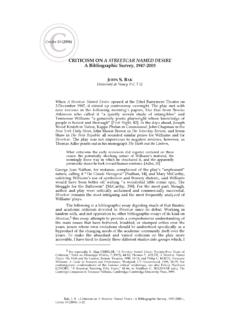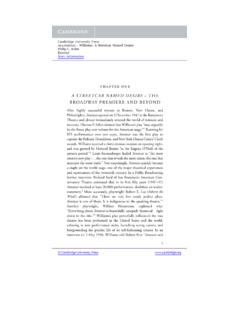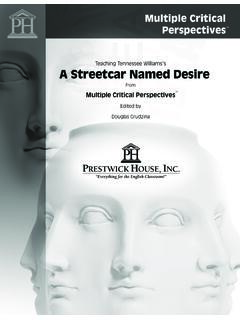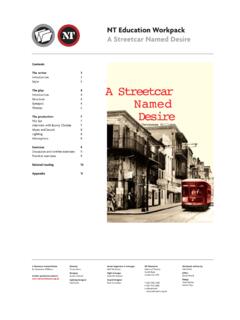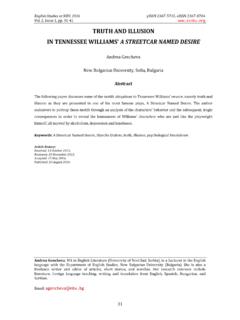Transcription of Authorizing History: Victimization in 'A Streetcar …
1 Authorizing history : Victimization in "A Streetcar named desire "Author(s): Anca VlasopolosSource: Theatre Journal, Vol. 38, No. 3, Performance of Textual history (Oct., 1986), pp. 322-338 Published by: The Johns Hopkins University PressStable URL: .Accessed: 15/12/2013 13:10 Your use of the JSTOR archive indicates your acceptance of the Terms & Conditions of Use, available at ..JSTOR is a not-for-profit service that helps scholars, researchers, and students discover, use, and build upon a wide range ofcontent in a trusted digital archive. We use information technology and tools to increase productivity and facilitate new formsof scholarship. For more information about JSTOR, please contact .The Johns Hopkins University Press is collaborating with JSTOR to digitize, preserve and extend access toTheatre This content downloaded from on Sun, 15 Dec 2013 13:10:59 PMAll use subject to JSTOR Terms and ConditionsAuthorizing history .
2 Victimization in A Streetcar named desire Anca Vlasopolos In a remark characteristic of judgments passed on modem drama, a critic notes that if Shakespeare had written A Streetcar named desire , it would have been called a "problem" Like Elizabethan and later "problem" plays, themselves so dubbed because "the term gives least offense," A Streetcar named desire raises questions about genre and ethics, as well as about performance and audience While the ideology of dramatic genre conceals the Victimization inherent in tragic and comic form, both the "problem" plays of earlier centuries and the "crisis" plays of the twen- tieth tend rather to unmask the violence involved in Victimization . This unmasking has disturbed critics and audiences alike. The "problem" comes from the strategies that these plays deploy to implicate the viewer in their violent processes of histori- ography - the processes of constructing a narrative of the characters' pasts - instead of purging the viewer of emotions associated with crises.
3 A Streetcar named desire makes explicit an issue announced, but still undeclared, in earlier "problem" plays, namely, the narrative authority of history -makers and story-tellers versus the dramatic representation of the victims of that authority. Academic criticism of A Streetcar named desire has been directed primarily toward the ethical and generic aspects of the play, and has focused on whether the play can be classified as a tragedy. In general, critical interpretations that take generic forms as Anca Vlasopolos is Associate Professor of English at Wayne State University. Author of The Symbolic Method of Coleridge, Baudelaire, and Yeats, she also has published articles on drama, film, and the Romantic period. She is currently writing a book on anti-generic theatre. 1 John M. Roderick, "From 'Tarantula Arms' to 'Della Robbia Blue': The Tennessee Williams Tragicomic Transit Authority," Tennessee Williams: A Tribute, ed.
4 Jac Tharpe (Jackson: University Press of Missouri, 1977), 116. 2 E. M. W. Tillyard, Shakespeare's Problem Plays (Toronto: University of Toronto Press, 1950; rpt. 1971), 1. 322 This content downloaded from on Sun, 15 Dec 2013 13:10:59 PMAll use subject to JSTOR Terms and Conditions323 / Authorizing history normative attempt to contain the disturbances produced by generically liminal plays like A Streetcar named desire , plays in which the values that lead to the installation of genre as norm come into question. For instance, in a sweeping indictment of twentieth-century drama, Raymond Williams argues that the "rhythm of tragedy" - which in the classical age made the sacrifice of the hero regenerative - is gone; what we have instead is a resignation to general guilt among audiences who identify with a victimized This nostalgia for the regenerative sacrifice of classicism overlooks the hypocrisy of catharsis both on stage and off: the crisis on stage resolved by murderous unanimity, the audience purged of the very emotions that might lead to rejecting violence as a means of regeneration.
5 Most of the criticism of A Streetcar named desire concerns itself either with Ten- nessee Williams's failure to achieve a unified generic tone or, more obsessively, with the main character as a separately functioning unit of the performance. The generic and ethical yardsticks used to measure the play's success show that A Streetcar named desire fails either because it has no ethics ( , no moral instruction for the audience), or because it is a "modern tragedy," in the terms of Raymond Williams, rather than an Aristotelian Critics who regard the play neither as typical of the failure of tragedy in the modern age, nor as an anomaly among modern plays, nor yet as a suc- cessful tragedy attempt to domesticate the violence at the center of A Streetcar named desire by treating the play as realistic drama. They propose that the course of history makes the main character's displacement inevitable and that her violation and expul- sion are "natural.
6 "s Apart from the generic unintelligibility ascribed to the play, the portrayal of the hero, Blanche, has led to readings based on standards other than aesthetic ones, judgments which, though violently opposed in their reactions to Blanche, concur in their exclusive focus on the hero as the moral key to the Perceptions of Blanche as the sole representative of sensibility destroyed by a callous society stand side by 3 Raymond Williams, Modern Tragedy (Stanford: Stanford University Press, 1966), 157-58. * See Joseph Wood Krutch in The Modern Temper (New York: Harcourt Brace, 1929), 14; Orrin E. Klapp, "Tragedy and the American Climate of Opinion," Two American Tragedies: Reviews and Criticism of Death of a Salesman and A Streetcar named desire , ed. John D. Hurrell (New York: Scribner's, 1961); Signi Falk, "The Profitable World of Tennessee Williams," Modern Drama 1 (1958): 172-80; Kenneth Tynan, "American Blues: The Plays of Arthur Miller and Tennessee Williams," in Two American Tragedies, 129; David W.
7 Sievers, "Freud on Broadway," in Twentieth Century Interpretations of A Streetcar named desire , ed. Jordan Y. Miller (Englewood Cliffs: Prentice Hall, 1971), 90-93; John T. von Szeliski, "Tennessee Williams and the Tragedy of Sensitivity," in Twentieth Century Interpretations, 65-72; Britton J. Harwood, "Tragedy as Habit: Streetcar named desire ," in Tennessee Williams: A Tribute, 104-15. - Jacob H. Adler, "Tennessee Williams' South: The Culture and the Power," Tennessee Williams: A Tribute, 30-52; Leonard Quirino, "The Cards Indicate a Voyage on A Streetcar named desire ," Tennessee Williams: A Tribute, 77-96; Joseph N. Riddell, "A Streetcar named desire - Nietzsche De- scending," Modern Drama 5 (1963): 423-30. 6 My use of the word "hero" rather than heroine emphasizes the active centrality of Blanche Dubois to A Streetcar named desire .
8 This content downloaded from on Sun, 15 Dec 2013 13:10:59 PMAll use subject to JSTOR Terms and Conditions324 / TI, October 1986 side with descriptions of her as sexually immoral or as a prostitute and nympho- Some critics feel so strongly about Blanche that they envision her death at the end of the play, even if the plot only allows us to see her carried off to the Responses to performances, as reported by directors and reviewers, are not as one- sided as the academic responses to the text because they contain a deep ambivalence: the savage rejection of Blanche combines with the discomfort of identifying with her destroyer and accepting the circumstances that make him Although purists unquestionably differ from the audiences who enjoy the play "for the wrong reasons," the responses of both groups point to certain deficiencies in the generic and ethical approaches that have been taken toward A Streetcar named desire .
9 If generic criticism has tended to remain neo-Aristotelian, it has conveniently discarded Aristotle's caution about the limitations of women heroes and the implica- tions of his ' Consequently, the single-minded concentration on the per- sonality of the hero and the search for a flaw that explains his/her downfall, which have been applied to A Streetcar named desire since its first performance in 1947, and the Aristotelian focus with its constricted view of women have brought to the fore only certain aspects rather than the central concerns of the play. The larger context of the ethics represented by the play has also suffered from a critical standpoint domi- nated by a firm faith in the progress of history . Thus, instead of being examined criti- cally, the violence in A Streetcar named desire becomes symbolic of the necessary and inevitable evolution from past to present.
10 By bringing literary applications of anthropology as well as deconstructionist and feminist methods of reading to A Streetcar named desire , criticism can move beyond the urge to classify the play generically, toward a questioning of the desire for control 7 For defenses of Blanche's moral character see Leonard Berkman, "The Tragic Downfall of Blanche DuBois," Modern Drama 10 (1967): 249-57; Bert Cardullo, "Drama of Intimacy and Tragedy of Incom- prehension: A Streetcar named desire Reconsidered," Tennessee Williams: A Tribute, 137-53; Harold Clurman, "Tennessee Williams," Lies like Truth: Theatre Reviews and Essays (New York: Macmillan, 1958), 72-80; Durant da Ponte, "Williams' Feminine Characters," Twentieth Century Interpretations, 53-64. For condemnations of Blanche see Robert Emmet Jones, "Tennessee Williams' Early Heroines," Modern Drama 2 (1959): 211-19; Philip Weissman, "A Trio of Tennessee Williams' Heroines: The Psychology of Prostitution," Twentieth Century Interpretations, 57-64; George Jean Nathan, "The Streetcar Isn't Drawn by Pegasus," in Twentieth Century Interpretations, 37; Howard Barnes, "O'Neill Status Won by Author of ' Streetcar ,"' in Twentieth Century Interpretations, 35.

